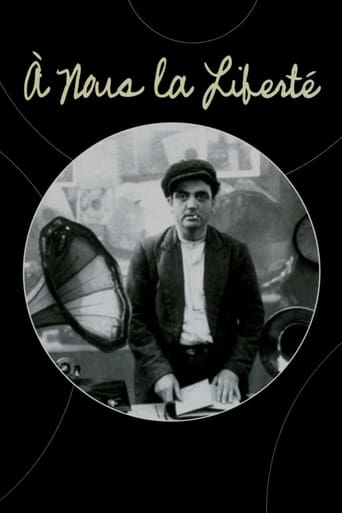treywillwest
It was striking watching this film shortly after having attended a very fine museum exhibit on American Precisionist painting, a style in vogue at the time this film was made. As in Precisionism, the imagery here is concerned with the industrialization of society. Every facet of social life, not just the work-place, but the school and the prison-system seems to director Rene Clair to have been turned into a factory. The film features some extremely clever editing making the connection between industrial production and the production of passive subjects of capitalism clear.
The difference between Clair and the Precisionists is that most of the latter saw in industrialization a utopian promise. What few who didn't, such as George Ault , understood industrialization in apocalyptic terms. In either case, it represented for the Precisionists an absolute transformation of life from which there was no turning back.
For the filmmaker's part, Clair clearly understood modernity in sinister terms, industrialization bringing about the mechanization of the subject, but his humanism made it impossible for him to see the modernist challenge to humanity as insurmountable. For Clair, human dignity could be salvaged just by forsaking the materialist temptations of capitalism for the simple pleasures of life. Exploiter and exploited could return to a loving, communal relationship by embracing poverty and freedom.
Art historians have proposed that the utopianism of Precisionist art was abolished by the horrific realizations of WWII. That would, it seems to me, to apply equally to the humanist utopia of Clair's cinema.
borisreviews
In René Clair's "A Nous la Liberté," Henri Marchand and Raymond Cordy are woefully miscast as two ex-convicts. I had high hopes for this picture, but ultimately the humor fails to produce laughs and the satire is misguided and disconnected from the truth. The tone of the movie is sharply uneven and that's likely due to the fact that the movie had no shooting script and the actors were forced to improvise. This ultimately leads to the fragile and disjointed structure. I have no idea why René Clair trusted these actors to build the foundation for his movie - they simply do not have the screen presence or charisma to carry a film. On that basis alone, the movie is not effective and thus I cannot recommend it. With that said, the score provided by Georges Auric is one of the positive aspects of this movie, as it attempts to match the movements of the assembly line. It almost makes up for the lack of chemistry between Marchand and Cordy. René Clair shows glimpses of promise and with better actors he might have pulled this off, but his lack of vision is accentuated by the lack of truth in the messages he attempts to portray.
poe426
The contention that Charlie Chaplin ripped off Rene Clair's A NOUS LA LIBERTE may have merit (if not, we're talking about one of the greatest coincidences in the history of cinema)- but... When one considers the fact that Clair openly acknowledged Chaplin's influence on his own cinestyle, the point can almost be considered moot. (Certainly there are entire sequences- many of them silent- throughout A NOUS LA LIBERTE that echo Chaplin's style. Shockingly so.) At any rate, both Clair's film and Chaplin's "rip-off," MODERN TIMES, owe a debt to Fritz Lang's brilliant epic, METROPOLIS. (Osamu Tezuka, who would go on to be acknowledged as one of the seminal creators of contemporary manga and anime, would do his own manga version of METROPOLIS years later.) Regardless, Clair was a great filmmaker in his own right. UNDER THE ROOFS OF Paris, which literally begins and ends on the same note, is another Clair film worthy of note: the unprecedented use of sound alone makes this one a must-see for students of film. When it comes to the controversy of A NOUS LA LIBERTE versus MODERN TIMES, it's simply a case of six of one, half dozen of the other. They're both great films, by two of the greatest filmmakers to ever make films.
puzzow
I profess-- I never heard of this movie nor this director till I watched it tonight. As pointed out, the film has a socialist message-- mainly a scaffolding to hang some very clever physical humor on, though it manages to fit in a few astute (likewise hysterical) observations about modern industrial society. The male leads are absolutely charming and have great chemistry. The style of the film is something in itself. The soundtrack (one of the first original ones to be used in a film) is intertwined with the action on screen, and occasionally the actors sing along with it almost as if this were a musical...but not quite. There are moments of pantomime infused with talking scenes, almost as if the director was trying figure out how to work his style for making silent films into talkies. In total, it's a bit odd-- but it works! And it's unique. And far from dated-- it gave me quite a few belly-laughs.



